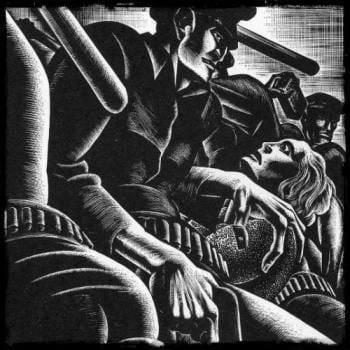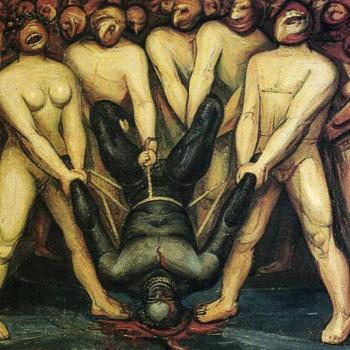“I wish it need not have happened in my time,” said Frodo.
“So do I,” said Gandalf, “and so do all who live to see such times. But that is not for them to decide. All we have to decide is what to do with the time that is given us.”
– J.R.R. Tolkien, The Lord of the Rings
_____

I wrote this essay in the immediate aftermath of the 2016 presidential election. Reading it nearly 3 years later reminds me of the dreadful emotions that draped themselves upon me that evening, this revelation that Donald Trump was in fact Darth Hidious, the uncoiling bastard spawn of Emperor Palpatine/Darth Sidious.
I am also depressed to learn that all of this essay’s most pungent fears have come to pass. This moment in history is nowhere nearing being done. All because Donald Trump simply could not abide that he had been governed for the previous eight years by Barrack Obama, a racially mixed African-American who embodied an enlightened spirit, graceful sang-froid, and intellectual gravitas forever out of reach from Trump himself, and from his “base” – the noxious, nihilistic murder of human crows upon which he leveraged his election.
Unfortunately, I am not sure the Democratic Party has learned the appropriate lessons from this debacle. But more on this concern in another post.
Snark Tank
I could not watch the presidential election debates. The visuals and audio distracted and agitated me. Everything about the debates that made the Saturday Night Live sketches amusing – melodrama and pathos, personal insufficiency and insufferable arrogance, and prurient and bottom-fishing viewer sensibility (let’s see the train wreck, OMG! WTF! HaHa!) – only depressed me, dragging me to the edge of vertiginous despair, imagining a reality show called Snark Tank (with a nod to Sartre and Nausea), in which I have as much desire to watch as I do to hang myself. Unfortunately, our national trials may only have just begun. I am bunkering down.
This Will Not End Soon
In this stretch run of the nation’s most hideous presidential election campaign since 1860, exhaustion is palpable. Dread pervades mundane details of our lives, and surely this dread is justified. We yearn for surcease, but the election itself will not bring peace. As we instinctively know (but would generally like to forget), the election itself (and the improbable ascent of the improbable, possibly insane, Donald Trump) is not cause but effect.
The deep structure of hatreds ripping apart the nation will persist, probably for years, and may plunge the nation into unprecedented mayhem, because the underlying mechanics of the crisis are a toxic, embedded, and unyielding mix of demography, technology, economics, and culture. Breeding a deeply emotional and psychological response entirely opposed to the interest-based rationalism by which liberal democracy justifies itself.
In the parlance of the psychology of personality disorders, we are experiencing a surreal national condition of emotional dysregulation. Donald Trump’s most enduring legacy may be the degree to which he has liberated and sanctioned and normalized a thuggish, emotionally charged politics of fear and intimidation.
Backlash
The lurid temptation exists to focus on personalities during presidential election campaigns, never with more avid, gob-smacked awe than in 2016, particularly as we wrap our heads around the sociopathy of the Trump freak show (parturition of zombies manifesting from burning corn fields). But obsession with personalities is a mistake. To stay sane, we simply cannot avoid attention to cultural dynamics rooted in geographic partition and economic disjunction, forces, pendulously sweeping back and forth across the nation like thunderclouds spawning their own high winds, crackling with electricity.
In the heady days immediately following the 2008 election (a brief moment when the memes of Dope and Nope and Rope had yet to ravage the positive message of Hope), few anticipated the inevitability of such a primal backlash to the reality of an African-American president. Few were prepared for the degree to which this response would posthole electoral and legislative reaction into a rictus of reactionary revolution now immanent within the American heartland.
Existential Trump
Parsing Trump and Clinton campaign speeches, roundtable events, and primary debates since January 2015 reveals an emphasis by Trump on science as an instrument of security and defense (Clinton emphasizes science as a driver of economic development, STEM education, and applied knowledge). Trump’s instrumental and technical understandings of science reflect the zero-sum, territorial, and extractive dynamics of his psychology (and of his appeal to the extractive, mineralized heartland), in which any gain for one party requires an equivalent loss for another party.
The primitive nationalism Trump espouses is essentially a brute-force, mercantilist narrative of enforcement, domination, deception, and indifference to consequences of one’s actions. In this narrative, science is only useful insofar as it provides a means to secure our national interests, which (pretty much by definition) means enforcing our will elsewhere, for which the byproduct is greater insecurity for other nations. Once again, we can see in this view of the world a pitiless Hobbesian sensibility, not much more refined than a war of all against all.
Legislative Collapse
Donald Trump promises to deliver the world to his partisans in his first week as president – the overarching themes of this carnivalesque purge/pogrom/program being gleeful deconstruction of Obama’s signature policy achievements and vengeance upon his supporters. Some of these wrecking ball initiatives will require Congressional assistance, but many will not.
In the absence of legislative sanction, almost all of Obama’s most important initiatives depended on executive actions. The problem, of course, is that Congress no longer legislates. And without a considered (or unconsidered) legislative firehose, any presidential legacy remains inherently fragile, easily subject to reversal by subsequent executives.
We also need to understand that Congress is now held hostage to inquisitorial, predatory Tea Party priests whose spiritual mandate is to destroy the democratic legitimacy and efficacy of governing institutions that bind together the national fabric. It’s an unimaginably sad and bitter state of affairs.
White Supremacy and the Republican Party
White supremacy is culturally the natural, logical end of Tea Party politics. White supremacy revanchists, while a minority, are not marginal to the campaign. They are its energy and its spirit, spiked, toxic tails furiously wagging the besotted dog.
One outcome we cannot discount is that a Trump victory will liberate the Alt-Right to provoke the race war that has always been their final aim, a kind of millennial rapture exalted and burnished by Donald’s Trump’s own lunatic, grandiose posturing. After brief, pause, the craven return of Republican Party minions to their own vomit ominously prefigures a moment when government turns its sights on the most vulnerable members of our society, with implicit sanction for a para-militarized Citizen Comitatus to take matters into their own hands.
To think those whom they target will not respond in kind is naive at best.
Demographic Divisions
The New York Times published a useful, data-driven analysis of the demographically narrowed white rural base of the Republican Party, which even as it only fractionally represents the fullness of the nation, has been able to exploit the surplus concentration of Democratic voters within relatively smaller numbers of urban Congressional districts. This urban-rural gash through the nation, while always an axis of cultural difference and political conflict, has exploited the outflux of whites from cities into isolated pockets of self-referential loops of nostalgia and fantasies about the historical and contemporary realities of American life, cementing the influence of the Tea Party across a vast but inbred swath of the nation.
There is room for hope. Perhaps. Many reliably Republican congressional districts in exurban swaths of the country are themselves shape-shifting under the pressures of economic globalization, industrial and agricultural automation, racial and ethnic migration patterns, and environmental disruption. With white populations in these areas aging and in decline, at some point in the not-too-distant future, the existing foundations of politics in rural Republican states will collapse. What fills the void, however, remains an open question.
Politics as Usual
It’s crucial to emphasize that elites from both political parties, isolated within their own insular, self-referential bubble, can take the lion’s share of the blame for this dizzying descent of American politics. Rather than explore and probe the sources of fermenting discontent and alienation, particularly in the wake of the global financial and economic meltdown in 2008, coastal elites (none more than the Clintons) simply elided the very real agonies of this flyover population from their consciousness in favor of an entitled “politics as usual,” demarcating themselves from activists by invoking the shibboleth of “populism.” And are now reaping the whirlwind of their own obduracy.
Perspectives on Populism
In fact, recurring references to the Trump (and Sanders) movement as manifestations of populism are anachronistic and misleading. True populism was an authentically democratic American protest movement in the late 19th and early 20th centuries that focused on creating cooperative agrarian institutions to empower farmers (mostly in the South and in the Midwest) buckling under the tightening grip of emerging national and monopolistic financial, commercial, and transportation companies.
Populism eventually devolved into the cranky and racist fulminations of Southerners such as Tom Watson and Pitchfork Ben Tillman, but contemporary use of the term is anachronistic and misleading. The “populist” shibboleth is now almost exclusively used as a patronizing term for groups and ideas that threaten the hegemony of globalizing elites. The term also serves to narrow the scope of discourse to a kind of political incrementalism that (almost by definition) fails to take seriously the legitimate fears and concerns of “ordinary” Americans.
Trump may be emotionally crippled and dangerously self-consumed. But millions of Americans do support him (astonishingly large numbers, in fact), not all are Alt-Right racists, and we need to understand far more deeply the causes and consequences of their alienation from existing political institutions.
Perspectives on Globalization
The ugliness of the presidential election in the United States is not an isolated phenomenon, and not reducible to domestic political theatrics. Indeed, one finds politicians across the globe, and more specifically in Europe, exploiting economic and ethnic disquiet to encourage and incite nationalist, neo-fascist spasms that current politics in the United States largely echo. The common denominator of these nationalist movements is a generalized and despairing distress in the aftermath of the global economic and financial crisis, which has gradually transformed itself into a roiling anger at political and financial elites and encroaching nonwhite immigrants.
The prevailing emotional state throughout Europe, as well as in the United States, is combined revulsion and contempt for elites and outsiders that directly results from the vagaries and mysteries of global capital and population flows, the resulting erosion of stable cultural identities demarcated by the formerly clear (or at least ostensibly clear) boundaries of nation and race, and the corresponding failure of globalization’s reputed economic benefits to accrue to what we might call each nation’s flyover population.
Liberal Democracy, Capitalism, and the Nation-State
One way to ponder the meaning of these global developments is to remember there may be nothing inevitable about the specific cluster of philosophical, political, economic, and geographic configurations we associate with “the West” and with the “modern era” (let’s call these configurations the emergence in the last 500 years of civil society, capitalism, the rule of law, and the sovereign nation-state). In fact, comparative and historical perspectives clearly tell us that the liberal democratic, capitalist nation-state is disjunctive and exceptional, and entirely vulnerable to collapse when confronted with tectonic environmental forces that have levelled other dispensations throughout human history.
In this context, the flaying of the liberal body politic at the very moment when global capitalism seemed poised to definitively establish itself, is less a surprise than it is an expected historical outcome, as is reversion in this environment to authoritarian, militarized, threat-sensitive political regimes that successfully impose often-brutalizing values of security and control. Hobbes Trumps Locke.
Constitutional Collapse
The U.S. Constitution is a nearly 230-year old ossified legal document of questionable relevance to modern American politics, except insofar is it lends political cover for national attachments and fetishes Tea Party marginals have used to essentially rip a new asshole for the nation. I’m talking about you, Second Amendment, which so far as we can tell from political debate (including the Trump-Clinton presidential debates), is the only part of the Constitution that anyone cares about (beyond sanctification of the idea that non-human corporations can claim the rights of human individuals, perhaps to a greater degree than human individuals themselves).
We can partly blame the purblind originalist and textual fetishes of Antonin Scalia (his scalding recursive / rhetorical flourishes continually telling us the Constitution essentially serves merely itself) for the brittle state of the Constitution, its recent failure to provide robust support for policy debates vital to national life in the 21st century, not the 18th century. In the absence of any tensile, elastic conformity to the needs and concerns of a fractured America in the age of autonomous vehicles and predator drones (not flintlock rifles and mule-drawn carts), the Constitution can legitimate and sustain very little beyond the fundamentalist buffoonery of those who fixate on its most cryptic and archaic provisions to provide whole-cloth sanction for crackpot schemes and skullduggery.
In the current crisis, the Constitution, that frail and worthless fabric, is not our friend.
Servant Leadership
What, then, can we ask of our leaders, and of ourselves, going forward? For starters, humility. Politics in the modern era is craven, but it needn’t be that way. The catastrophic Tea Party assault on public institutions and public service does not obviate the enduring realities and requirements of effective political leadership and communication.
Democracy requires legitimacy. Democracy requires trust. Democracy requires the pure of heart, the felt sensibility that our leaders exist only to serve us, not that we may serve them. Hillary Clinton should be wiping her rear end with Donald Trump. But Donald Trump exists precisely because her choices and actions and affiliations (and those of her husband) have permanently detonated her legitimacy for a vast swath of the nation
Oh, that we did not remain so chained to our histories.












